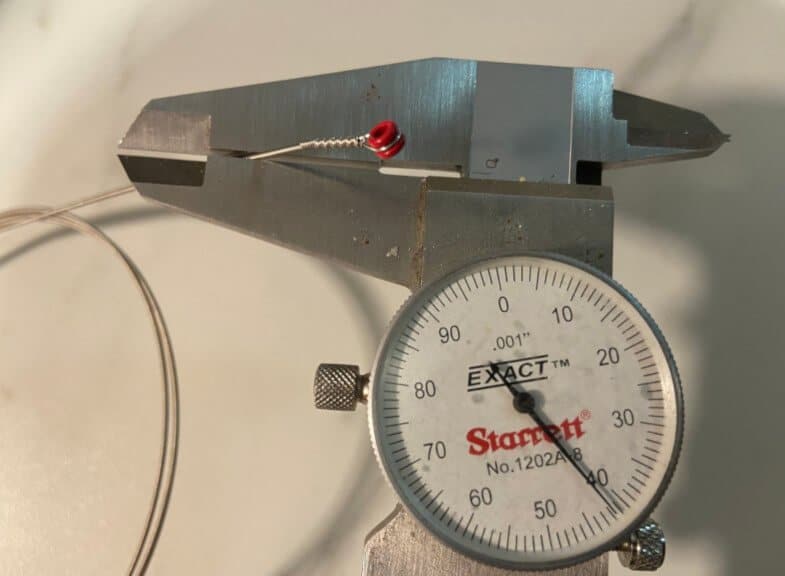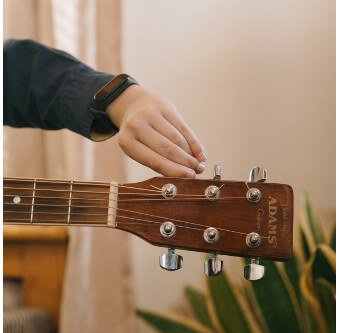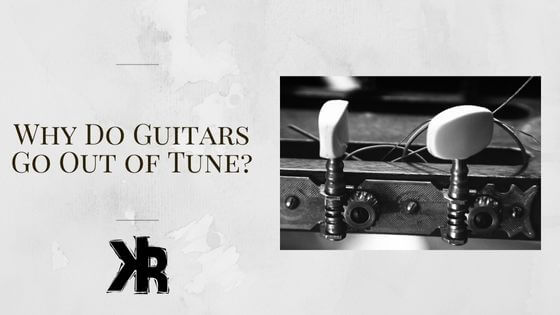Table of Contents
Guitars are an essential instrument in many genres of music! But they can be frustrating when they go out of tune. A guitar that’s out of tune can make even the most skilled player sound amateurish. So why do guitars go out of tune?
This Killer Rig article will explore the various causes of tuning issues. But also provide solutions for maintaining a guitar’s stability. This way, you can ensure that your instrument sounds its best every time you pick it up!
1. Climate Changes
Climate changes can greatly affect the tuning of a guitar. Changes in temperature and humidity can cause the wood in the guitar to expand and contract. This often leads to changes in tension in the strings. This can result in the instrument going out of tune.
It’s noticed not only in the neck, but the body too. Saddles can shift due to bulging on acoustic guitars, among other things.
Keeping your environment controlled is the best way to prevent any guitar problems. This means using a humidifier in a room that is dry. Or, removing moisture from an environment that is normally damp.
You also want to make sure the temperature is set right for the instrument. This is normally around 70 to 80 degrees Fahrenheit. Keep them out of direct sunlight as well.
This will help the wood stay the same no matter the conditions. It will help keep the tuning stable, but is good for every other wooden part of the guitar!

2. Strings are not Stretched
New strings need time to stretch to a point where they can maintain tension and hold tune. They don’t come from the factory pre-stretched and need time to adapt.
When you put new strings on your guitar, there is a break-in period that comes along with them. For the first couple of days, you can expect them to go out of tune a number of times.
Only time will fix this. Strings can take a couple of days to properly stretch out. You can help speed up this process, however. Once the strings are tuned up, bend them on the fretboard a number of times. Then tune it up again as they stretch.
If you do this a number of times every hour, you will notice they begin to fall out of tune less. The bending will help them stretch out quicker. This can be helpful if you have a gig coming up and just changed your strings.
3. Old Strings
If you have been playing the same set of strings for a while, they may not hold tune like they once could. As strings age, they begin to lose their ability to deal with the tension.
Even corrosion can set in and begin to weaken the windings and wire. At some point, the strings will go out of tune more frequently.
Changing your strings when they are old is the best way to prevent them from going out of tune due to age. You can prolong their life by keeping them clean. But if they are quite old, and you begin to notice the guitar slip out of tune, it’s time for a change.
Further reading: how often to change guitar strings?
4. String Slippage
String slippage can occur when players apply too much pressure to them. This can be due to aggressive techniques or even improper installation.
It eventually causes them to slip out of tune. A lack of wraps around the machine heads or poor seating of string ends in a bridge. These can all be factors why a string may not hold its tune.
Improper installation is quite common. First, make sure the strings are fastened to the bridge correctly. This could mean a ball end was not seated right and is moving. Or, the tie on a classical guitar bridge was not tight enough.
5. Poor Instrument Maintenance
Neglecting to clean and lubricate the guitar can lead to tuning problems. Dirt and debris can accumulate on the strings. This can cause them to stick and affect their ability to vibrate freely.
The guitar nut is a great example of this. If the string can’t move freely, tuning can suffer. Regular cleaning and maintenance will alleviate these issues.
Time for some guitar maintenance! Clean the guitar and parts thoroughly. Look for loose parts and fasteners and tighten them. Inspect the nut and bridge and make sure they are not worn or broken.
You will also want to lubricate the nut to help the strings glide through it. This can prevent binding, which causes tuning issues.
6. String Gauge
The gauge of the strings used on a guitar can also play a role in tuning stability. Thin strings have less tension, which is helpful. But they can be more prone to slipping out of tune. This is because sometimes they need more wraps around the machine head.
Often times players don’t consider this. They then use a certain number of wraps that are better for thicker sets. And so a heavy bend may result in slippage.

If you are a lead player, then thin strings are a must. If you do a lot of bending, this can cause issues with light gauge strings. Or, if you are a rhythm player and very aggressive, consider heavier strings.
Sometimes a new gauge can help fix tuning issues. But we also suggest that you are using a guitar that can handle your technique. Sometimes a locking nut can fix all problems!
7. Nut and Saddle Wear
Nut and saddle wear can also affect the tuning of a guitar. The wear can cause the strings to sit too low, leading to tuning issues. This may be recognized more as an intonation issue, but a potential problem nonetheless.
Regularly checking the nut and saddle will prevent tuning issues caused by wear. It’s important to choose high-quality nuts and saddles! But to also have them adjusted by a professional if necessary.
If they look worn or have any other obvious issues, replace them. It can also be helpful to add some lubricant to the nut in order to prevent wear.
8. Incorrect Capo Placement
Incorrect placement of a capo can cause the guitar to sound out of tune. A capo that is placed quickly and incorrectly can pull strings too far down. In most cases, it’s only one of two. But it causes the guitar to become out of tune.
Use care and place a capo carefully and in the right location. Properly positioning the capo can help prevent tuning issues. Check the placement of the capo before each use.
Ensuring it is correctly positioned will help maintain the tuning of the guitar. Also make sure the capo is not damaged or worn where it comes into contact with the strings!
9. Incorrect Technique
Large bends and improper playing technique can also lead to tuning issues. Bending strings very far or using too much force can cause them to go out of tune.
This includes the use of a tremolo bridge as well. If the conditions are not perfect, the strings may slip on the machine heads enough to go out of tune. Sometimes you also need to make sure you have the right guitar for your style.
Adjust technique and avoiding excessive string bending can help prevent issues. If you’re playing too aggressive, you might be the reason for the tuning problems.

10. Loose Tuners
Cheap or worn tuners can also cause issues with tuning stability. They can slip on the gears or even turn if there are bigger problems inside.
Sometimes all it takes is tightening screws and checking for loose parts. But in other cases, they may need to be replaced completely.
Inspect your tuners. Do they feel tight and rigid? If there is any movement or backlash, they might be worn out.
FAQs
How long should a guitar stay in tune?
This depends on the guitar, but some never go out of tune. That’s right. Unless you bump the tuners and knock it out, some instruments are stable!
But they use high quality parts and are set up as they are required to be. Other guitars will need to be tuned every time you play. Maybe several times. If you want a guitar that is super rigid, speak to a professional.
Do thicker guitar strings stay in tune better?
Yes, a thicker string set will hold tune better than any thinner ones. But this is based on every other variable being the same.
So if the bridges, nuts and tuners are rock solid. Then yes, this will be true. But first you need to make sure the parts are all in great shape!

